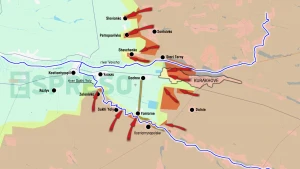
Evidence indicates Russians blew up Kakhovka dam deliberately — ISW
The Institute for the Study of War believes that the balance of evidence, arguments and rhetoric indicates that the Russians blew up the Kakhovka HPP dam deliberately
This is stated in the latest report of the American Institute for the Study of War (ISW).
White House spokesman John Kirby said that the United States still cannot say definitively what caused the dam to collapse, but is evaluating reports of Russia causing the explosion.
NBC television reported that the United States has intelligence that points to Russia's responsibility for detonating the dam, but is currently working to declassify the information. Various European officials have also issued statements indicating that they believe Russia was involved and emphasizing the humanitarian consequences of the flooding.
"ISW cannot offer a definitive assessment of responsibility for the June 6 incident at this time but finds that the balance of evidence, reasoning, and rhetoric suggests that the Russians deliberately damaged the dam," the statement said.
Statements by US and European officials are largely consistent with ISW's October 2022 prediction that Russia has a greater and clearer interest than Ukraine in flooding the lower Dnipro basin, despite the damage to its own defense capabilities and armed forces.
The Russians can use the flood to widen the Dnipro River and complicate Ukrainian counteroffensive attempts across the already difficult area.
Kakhovka dam explosion
On June 6, the Russian occupying forces deliberately blew up the Kakhovka Hydroelectric Power Plant (HPP), resulting in its complete destruction. The evacuation of affected residents has started as areas began to flood. President Volodymyr Zelenskyy immediately convened an emergency meeting of the Security and Defense Council, and the global community responded on a large scale. A detailed account of the events can be found here.
The Ukrainian Cabinet of Ministers allocated UAH 1.5 billion for the construction of two new water pipelines, which will provide drinking water to Kryvyi Rih, Nikopol, and Marhanets. Another UAH 846 million was allocated to the Kherson, Mykolaiv, Zaporizhzhia, and Dnipropetrovsk regions to deal with their drinking water problems. Several Ukrainian cities have also expressed their willingness to accommodate displaced residents from the affected areas in the south.
Despite the destruction of the Kakhovka HPP, Lieutenant General Serhiy Nayev, the commander of the Joint Forces of the Armed Forces of Ukraine, assured that it would not hinder the counteroffensive of the Ukrainian Armed Forces. He further stated that the Kyiv HPP is well-protected against aerial attacks and enemy sabotage attempts.
Ihor Syrota, the general director of Ukrhydroenergo, reported that the peak water spillage from the Kakhovka reservoir is expected on the morning of June 7. Following that, the situation is expected to stabilize, and the water levels will gradually recede within 4-5 days.
President Zelenskyy held a meeting with the supreme military staff to discuss the situation at the front lines, preparedness for a counteroffensive, and the deliberate destruction of the Kakhovka HPP by Russia. He emphasized that Russia had mined the dam of the HPP last year, and Ukraine had been prepared for such an explosion. Zelenskyy also discussed the consequences of the hydroelectric plant detonation and the risks to the Zaporizhzhia Nuclear Power Plant (ZNPP) with the head of the International Atomic Energy Agency (IAEA) and extended an invitation for him to visit Ukraine.
The Ministry of Agrarian Policy estimated that approximately 10,000 hectares of agricultural land on the right bank would be flooded as a result of the Kakhovka HPP's destruction.
On the evening of June 6, the United Nations Security Council convened to discuss the situation following the detonation of the Kakhovka HPP dam by Russian troops. Ukraine's Permanent Representative to the UN, Serhii Kyslytsya, stated that the destruction of the hydroelectric plant demonstrated Russia's inability to effectively administer the temporarily occupied territories. The UN Deputy Secretary-General acknowledged that the detonation would have far-reaching consequences for thousands of people.
US President Joe Biden expressed his reaction to the tragedy and pledged support and assistance to Ukraine.
- News














































